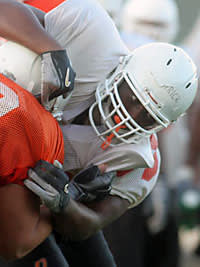Medical success; Not all washout after injury

Shortly after Sports Illustrated released the final part (Part Five: The Fallout)to their five-part series on Oklahoma State football - a day early and without much fanfare - former OSU defensive lineman Quencey Patrick took to Twitter to take exception to one of the main thrusts of The Fallout article; that the school and program had abandoned former receiver Artrell Woods after a devastating weight room injury.
Patrick signed with OSU in 2006 out of Columbus (GA) Pacelli Catholic High School. A moderately-highly regarded prospect (3-star, No. 41-ranked defensive tackle in the nation and No. 33 in Georgia) was one of the first in a steady stream of prospects from the Peach State signing with OSU in recent years. After redshirting in 2006, Patrick's career was cut short by injury.
Advertisement
"I had injured my shoulder in the Texas Tech game, I think it was in '07," Patrick said. "I ended up having surgery on my clavicle that following year. I tried to come back in 2008, but I started to find out that I really couldn't play anymore, just due to scar tissue. So I talked to (then head athletic trainer) Rob Hunt and the doctor and we decided it would be best for me to just go on a medical (scholarship) because I couldn't play anymore."
Based on his personal experience, Patrick took a very large exception to the insinuation by SI that OSU systematically abandoned players once they were no longer useful.
"All I had to do (while on a medical scholarship) was everything I was doing before (the injury and surgery) during my (football) scholarship, except go to practice," Patrick said. "I still had access to tutors. I talked to Terry (Henley) almost every other day. He steered me to get my minor (in Finance), so I wouldn't have just an Economics background. They even helped me get extra classes, because I stayed for an extra year - which I don't think they even had to do that - but they let me stay for a fifth year."
Patrick reported that he graduated in May of 2011 with a degree in Economics and minor course of study in Finance. He is putting his education to use, working for the Education Achievement Authority of Michigan. Though it wasn't required, Patrick and other medical scholarship players often helped out the football program in recruiting. Some times, that included on of the main focuses of The Fallout - former receiver Artrell Woods.
"Before I graduated I did help out with recruiting on game days," Patrick said. "Artrell was actually supposed to be there, helping us out on those Saturdays too. He rarely ever showed up, though. But I would help out with recruiting, see if the coaches needed anything. It was like a general 'assistant,' a little bit. I did that for a few hours a week."
Patrick empathizes with Woods, particularly since Woods had played in every game in his true freshman season (2006) and was on track to potentially be a breakout performer after a strong spring session in 2007. Patrick says the road back from injury and surgery can be a tough to deal with, particularly if you find yourself incapable of things you could do before injury. Patrick had to deal with that revelation himself and says others could see it happening with Woods.
"You can tell when somebody is not being used to be being able to do stuff (that they could before). Kind of like I wasn't able to bench press a lineman like I used to," he said. "You could see that he (Woods) was struggling with it. Maybe he didn't know how to deal with it at the time. When you go from being a star to riding what, third string? It is really difficult on your psyche and your ego. You've been doing so well your entire life and one freak incident happens and pretty much taken away all your athletic ability."
The repeated accusations attributed to Woods throughout the SI "The Dirty Game" series shocked Patrick, as did the news that Woods never graduated from OSU.
"It was news to me. I had no idea he didn't graduate," Patrick said. "I think he left the year before me…I didn't even know he went to UCO. He seemed perfectly fine when we were working up in the west endzone, when we were helping out with recruiting on game days. I had no idea he was feeling so harsh towards the school about that. That's what really surprised me (in reading the SI stories).
"I mean, you still had the opportunity to still graduate with your degree even though your career didn't pan out that you weren't expecting. You still had all of that money that you could get from your scholarship."
Patrick pointed to other examples of OSU players who successfully transitioned from scholarship members of the football team to medical scholarships in the same timeframe.
"There were other guys like me that converted to medicals and did well, like (offensive lineman Jacob Secrest and Jared Glover," Patrick said. "We knew that we still had to do what was right and go to class and fulfill our end of the scholarship, even though we weren't playing."

Click Here to view this Link.